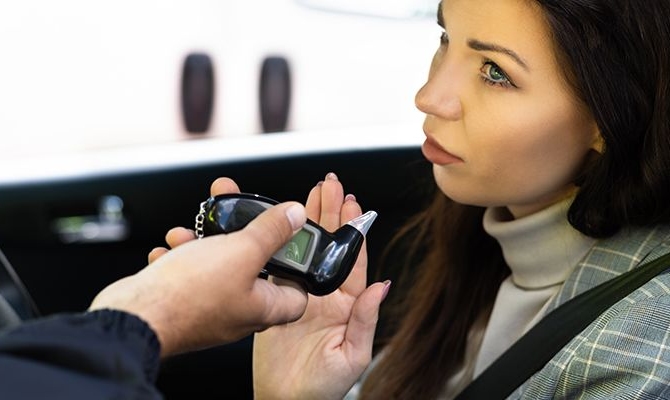142Views

If you’ve been arrested in Milton for DUI, many factors could skew your breathalyzer results and create discrepancies in court. Thanks to advanced breathalyzer technology, an experienced attorney can assess if the test was administered appropriately before challenging its accuracy in court.
Certain medical conditions, including acid reflux disease, can also have an effect on a person’s breathalyzer readings and thus need to be understood by anyone fighting drunk driving charges in Georgia.
1. Speeding Increases Alcohol Absorption
When you drink alcohol, it travels through your stomach and small intestine before entering your bloodstream and travelling to various parts of your brain and lungs. As you breathe out, some of it vaporizes into the air – this allows breathalyzers to measure how much alcohol evaporated into the air – to estimate your Blood Alcohol Content (BAC), which allows police to determine whether or not you are drunk.
As your alcohol consumption increases, so will your Blood Alcohol Content (BAC). In the US, the legal limit for driving is set at 0.08% BAC; however, most states set lower BAC limits for certain people such as teenagers. Therefore, greater efforts must be made to educate individuals of the risks of drinking and driving.
Diet, medication, physical activity and your type of diabetes all can have an effect on your BAC level, with diet being the single biggest influencer on this front. Diabetics sometimes suffer from hypoglycemia which can produce symptoms similar to intoxication; when this happens it could trigger a false positive for breathalyzer testing and lead to a DUI conviction.
Be mindful that, under law, when being stopped on suspicion of DUI by police officers, you are legally required to submit to a breath, blood, or urine test for assessment. Failing such tests could result in immediate arrest and license suspension – it is therefore vitally important that you understand your rights prior to making a decision on what course of action to take.
2. Speeding Causes the Residual Mouth Alcohol to Build Up
Mouth alcohol can lead to falsely elevated BAC test results, often in the form of false readings on breathalyzer tests. Mouth alcohol forms when alcohol-containing beverages become trapped in the mouth’s crevices and exhaled through inhaled breath samples later, inducing false high readings on a breathalyzer test. Other sources may include gastroesophageal reflux disease (GERD), where stomach contents containing alcohol regurgitate into throat and mouth areas; wearing dentures that trap liquid in small crevices; burping, smoking as well as certain medications including cough syrups can all produce mouth alcohol-producing false high BAC test results.
Mouthwash or breath spray containing alcohol may also contribute to mouth alcohol production, while metal implants, like new dental work or piercings can produce additional levels that alter a Breathalyzer test result significantly. Even small amounts of undigested alcohol in a suspect’s mouth can have a substantial impact on its result.
Due to breathalyzer testing assumptions that assume air is coming solely from your lungs, mouth alcohol can often skew test results inaccurately and cause them to fail. An experienced Milton DUI lawyer could use this fact against breathalyzer manufacturers by challenging the accuracy of breathalyzer tests against his client – this may even result in dismissal of DUI charges! Get in touch with James Novak now to see how he can assist.
3. Speeding Causes the Residual Mouth Alcohol to Dissolve
Individual variations in how people metabolize alcohol and eliminate it from the body can have an impact on breath test results, yet are often ignored when analyzing breath tests. Residual mouth alcohol residue may be one factor contributing to false positive readings on breath tests that register higher BAC values than what actually exists for someone’s individual blood alcohol content (BAC).
Mouth alcohol can come from numerous sources other than drinking alone. Mouthwashes, cough syrups and breath sprays often contain trace amounts of alcohol as do dental appliances and asthma inhalers. Chewing gum has also been known to absorb alcohol; for this reason police officers instruct breath test subjects to throw it away prior to submitting to their test.
Regurgitation of alcohol-containing stomach content may also lead to increased breath test readings, especially if someone suffers from GERD or acid reflux, or vomits prior to taking their breath test.
Accurate breath test results may also be affected by human error during administration of the test or technical problems with the breath testing machine itself, making it important for anyone facing DUI charges to hire an experienced attorney who can challenge its accuracy while creating a solid defense strategy.
4. Speeding Causes the Residual Mouth Alcohol to Remain
Breathalyzers typically measure air exhaled from one’s lungs as an indicator of alcohol in one’s bloodstream, however if someone has residual mouth alcohol it could produce an artificially high test result. Such residue could come from recent consumption of alcohol, use of mouthwash or breath fresheners containing alcohol, medical conditions such as gastroesophageal reflux disease (GERD) which causes regurgitation of stomach contents with alcohol present or any number of other causes.
Residual mouth alcohol typically evaporates over a 20-minute period. Police officers must observe DUI suspects closely during this time to make sure that no belching, burping, hiccupping or regurgitating occur, as this could alter a Breathalyzer reading.
Breathalyzer readings may also be altered by mouth temperature. When suffering from fever, sauna time, detention in a patrol car for extended periods or menstrual symptoms, breath temperature increases significantly causing Breathalyzer test results to falsely read deep lung air as deep lung air.
Many people mistakenly believe that chemical tests are the only reliable means of establishing driving under the influence. An experienced attorney, however, can challenge the accuracy of breath tests as well as question other forms of evidence that might be used against you in court proceedings.



